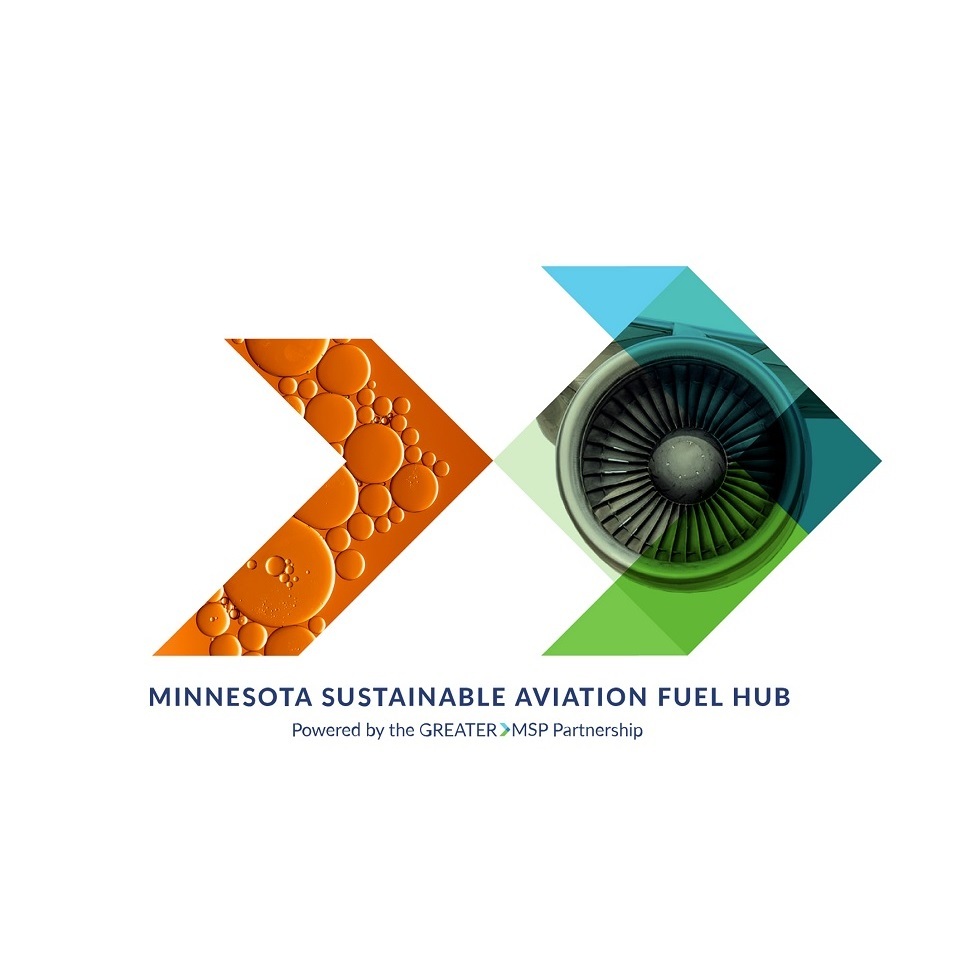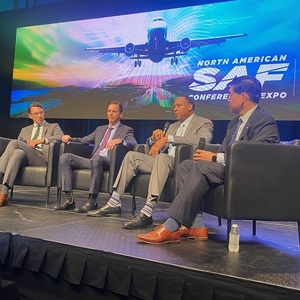Minnesota SAF Hub launches collaboration to scale SAF



SOURCE: Anna Simet
November 22, 2023
BY GREATER MSP Partnership
Through the GREATER MSP Partnership, Bank of America, Delta Air Lines, Ecolab and Xcel Energy have established the Minnesota SAF Hub – the first large-scale SAF Hub in the U.S. with unparalleled collaboration among key players across the value chain committed to scaling SAF production to replace conventional jet fuel. These anchor members are joined by other leading institutions, including the State of Minnesota, to implement an ambitious shared strategy for aggressively decarbonizing the airline industry.
This multi-year strategy is rooted in commitments to:
SAF is the best decarbonization lever the aviation industry has in the near- to mid-term on its journey to net zero. While airlines globally have committed to purchasing billions of gallons of SAF over the next few decades, there isn’t enough being produced currently to fuel commercial airlines globally for a single day.
Third on the World Economic Forum’s list of Top 10 Emerging Technologies of 2023, SAF is a safe, fully certified jet fuel that can be used in today’s aircraft engines and transported via existing pipeline infrastructure. Produced from many sources including renewable feedstocks and used cooking oil, SAF can reduce lifecycle carbon emissions of aviation by more than 80% - meaning exponentially fewer emissions from SAF than traditional jet fuel.
After eight months of behind-the-scenes collaboration, the coalition will share its ambitious objectives today at the North American SAF Conference and Expo in Minneapolis. Progress to date includes establishing a shared, multi-phase strategy, securing nation-leading financial incentives from the State of Minnesota, and building a growing coalition of Minnesota-based organizations including the anchor companies, State of Minnesota, the Metropolitan Airports Commission, the University of Minnesota, and knowledge partner McKinsey & Company.
Advertisement
Advertisement
A phased approach to scaling sustainable aviation fuel production in Minnesota
The Minnesota SAF Hub coalition is deploying a multi-phased approach to scaling production that begins with promoting the flow of SAF into the state and extends to supporting a robust and flexible SAF production infrastructure. The coalition is balancing pragmatism and ambition by using existing technologies to make progress as quickly as possible, while accelerating the technologies with the greatest carbon reduction potential.
Immediately – Scale Quickly Using Existing Feedstocks and Facilities
Next – Accelerate greenhouse gas reductions through innovations in agriculture
On the horizon – Maximize scale and greenhouse gas reductions with advanced technology
The Minnesota SAF Hub will accelerate commercial scaling of SAF. Strong policy support is complemented by a rich agriculture landscape, economical renewable energy sources, research and development capabilities, existing aviation fuel infrastructures and strong demand for jet fuel at MSP where Delta, alone, uses around 250 million gallons annually to power its operations – one of its largest global hubs. Through the combined efforts of this coalition and corporate partners, Delta aspires to use SAF for more than 10 percent of its fuel at MSP by 2027, with sights set on 50 percent by 2035.
To achieve its ambitious volume targets, the Minnesota SAF Hub coalition is actively recruiting forward-thinking producers and investors similarly committed to establishing Minnesota as a leader in sustainable aviation. We are seeking to assemble a collection of players along the value chain at a scale that has not yet been achieved anywhere in the world. Interested parties from around the world are encouraged to contact GREATER MSP directly to learn more.
Advertisement
Advertisement
Leaders focused on coalition’s critical mission
“Our SAF Hub will accelerate progress toward decarbonizing the airline industry nationally while also creating thousands of good jobs across Minnesota,” said President and CEO of the GREATER MSP Partnership, Peter Frosch. “It is good news that some of the world’s most innovative companies are combining forces to build SAF production at the scale the market demands and at a pace the climate requires. Together, we are recruiting the next set of partners to join this effort to build an integrated SAF value chain in the center of North America’s economy.”
“The Minnesota SAF Hub is the game changer aviation needs to start producing SAF at the volumes required to meet our aggressive goals,” said Delta CEO, Ed Bastian. “This coalition of heavy hitters from across the SAF ecosystem are collaborating to rapidly scale production, demonstrating the power of partnerships to meet our shared goal faster than any of us could do on our own.”
“We know from experience that the path to building a sustainable future requires collective action,” said Ecolab Chairman and CEO, Christophe Beck. “It was important for Ecolab to join other industry leaders on day one of the Minnesota SAF Hub, as our process innovation and technology expertise can help the coalition scale to meet the challenge and opportunity of sustainable aviation.”
“SAF is a next-generation technology that will help us advance our vision of providing net-zero energy to our customers by 2050,” said Chairman, President and CEO of Xcel Energy, Bob Frenzel. “We’re excited to support carbon reductions in the transportation sector by supplying carbon-free electricity and clean fuels like hydrogen and renewable natural gas, spurring commercial-scale SAF production in our headquarters state of Minnesota. This coalition also allows Xcel Energy to explore other end uses for SAF, including as a clean fuel for power generation and home heating.”
Related Stories
The USDA significantly increased its estimate for 2025-’26 soybean oil use in biofuel production in its latest World Agricultural Supply and Demand Estimates report, released July 11. The outlook for soybean production was revised down.
The U.S. Energy Information Administration maintained its forecast for 2025 and 2026 biodiesel, renewable diesel and sustainable aviation fuel (SAF) production in its latest Short-Term Energy Outlook, released July 8.
XCF Global Inc. on July 10 shared its strategic plan to invest close to $1 billion in developing a network of SAF production facilities, expanding its U.S. footprint, and advancing its international growth strategy.
U.S. fuel ethanol capacity fell slightly in April, while biodiesel and renewable diesel capacity held steady, according to data released by the U.S. EIA on June 30. Feedstock consumption was down when compared to the previous month.
XCF Global Inc. on July 8 provided a production update on its flagship New Rise Reno facility, underscoring that the plant has successfully produced SAF, renewable diesel, and renewable naphtha during its initial ramp-up.
Upcoming Events










